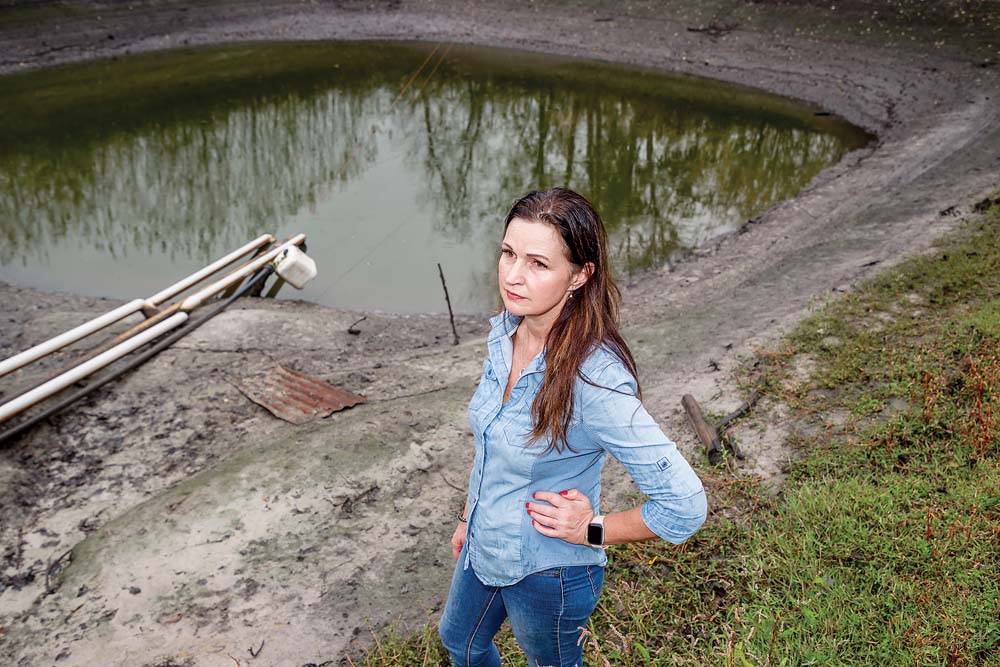
A BAXTER farmer says he could “double [our] workforce to 50 and triple or quadruple production” if his property had access to a reliable supply of recycled water.
Wayne Shields and partner Tash, from Peninsula Fresh Organics, grow 50 varieties of organic vegetables, such as heirloom carrots, beetroot and radish on their 16-hectare farm.
The couple also have 40 hectares at Barham on the Murray River, bought in 2013 to extend their growing season and their range.
The couple’s plight echoes that of Moorooduc orchardists Mark and Jacki Paganoni who are also suffering as the big dry continues. Their Atlanta Fruit Sales was on the verge of bankruptcy and their dam dry prompting Mornington Peninsula Shire Council to plead with the state government to declare the region “drought-affected” – a move that would allow hard-hit farmers, businesses and recreational users cheaper access to recycled water. (“Water offer saves the day (for now)” The News 1/5/19).
An offer by South East Water to allow them to access water from a main in nearby Stumpy Gully Road proved an acceptable short-term solution for the Paganonis.
Mr Shields said his Henderson Road business “can’t afford mains water, so we’re shut down basically”. He said he has had to let some workers go “because it is so dry.”
“Mains water can’t be delivered quick enough and it’s overpriced when it is delivered,” he said. “It costs $3000 a megalitre and it takes four days to get one megalitre.” He said about 2.5 megalitres would be needed to fill an Olympic size swimming pool.
To keep the farm operating fully, Mr Shields said he could “take up to three megalitres a day”.
The farms are part of a push by the shire, the National Farmers Federation and the South East Melbourne Group of Councils aimed at encouraging South East Water to redirect water flowing along the south-eastern outfall to Boags Rocks, near Gunnamatta, for use in agriculture and firefighting in the peninsula’s hinterland.
The South East Melbourne Group of Councils – which includes Mornington Peninsula Shire – is “calling on federal election candidates across the region to urgently act to avoid job losses and other consequences of water shortages”.
They are advocating for two recycled water projects in the region: Construction of a pipeline from a suitable point on the outfall to Somerville and Tyabb that they estimate would cost $20.5 million and create 361 jobs; and a $600,000 business case for the Hinterland Recycled Water scheme.
“Farmers in the southeast region need water to grow fresh produce, emergency services need water to fight fires and employers need water for manufacturing,” South East Melbourne board member Simon Crean said.
“Thousands of jobs depend on affordable and reliable water supplies in the region.
“Meanwhile we are losing 350 megalitres a day of class A recycled water from the south-eastern treatment plan, which is being pumped into the sea because of a lack of investment.”
Mr Shields says his small farm is restricted by a lack of water. “We run out of water every year and we only grow what we can think we can manage. This is one of the years we got caught out. Our dams are empty.”
The lack of water was forcing him to question whether the farm was viable. “We’ve got the soil, we’ve got the climate, we are a frost-free region, we have people who want to work for us and we have orders we can fill. Water is the missing piece.”
The mayor Cr David Gill said: “Agriculture contributes $1 billion to the Mornington Peninsula economy. It is imperative that the water that is currently being recycled is made available for the farms that need it rather than pumping it into the sea.
“With a reliable water supply we believe we can grow much needed jobs in the agricultural sector and provide the water security the region needs for emergency management and recreational uses.”
Flinders MP and health minister Greg Hunt said a returned Liberal National Government would spend $300,000 on a business case for the water scheme.
Hillock Downs beef and fodder producer Eddie Matt, of Rye, said farmers hoped all levels of government would consider investing in future water security for food production as a “top priority”.
Customer and community engagement manager Mikala Hehir said South East Water was working with the shire and the Department of Environment, Land, Water and Planning on a “number of opportunities to harness recycled water from the south eastern outfall”.
South East Water had “already embarked on work to assess factors, such as soil suitability, proximity to existing assets, terrain and synergy with existing industry – all of which determine the viability of recycled water irrigation.”



